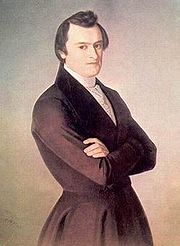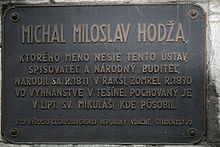- Michal Miloslav Hodža
-
Michal Miloslav Hodža 
Born 22 September, 1811
Rakša, Kingdom of HungaryDied 26 March, 1870
Cieszyn, Austria-HungaryOccupation Priest, poet, linguist and Slovak National Revivalist Michal Miloslav Hodža (22 September 1811, Rakša, Kingdom of Hungary – 26 March 1870 in Cieszyn, Austria-Hungary) was a Slovak national revivalist, Protestant priest, poet, linguist, and representative of the Slovakian national movement in 1840's as a member of "the trinity" Štúr - Hurban - Hodža. Michal Miloslav Hodža is also the uncle of the Czechoslovak politician Milan Hodža.
Contents
Biography
Life before the revolution
Michal Miloslav Hodža came from the a family of farmer-millers while his father was also a non-commissioned officer. Hodža studied in Rakša, Mošovce and later, at gymnasiums in Banská Bystrica and Rožňava. In the years 1829–1832 he continued his studies, focusing on theology, at the Evangelical college in Prešov. From 1832–1834 he continued to study theology at the Evangelical lyceum in Bratislava. During his study in Bratislava he began to work for the Czechoslovak Language and Literature Company. Also during his time at the lyceum, Hodža was a chairman's deputy of the same association. In the years 1834–1836 he worked as a tutor in Rakša and Podrečany. From 1834–1837 he continued his theological studies in Vienna where he was ordained a priest in 1837. In the late 1830s he published in educational and didactic magazines such as Krasomil, Vedomil tatranský, Slovenské noviny and Slovenská včela. He was also a co-author of Prosbopis liptovského seniorátu whose purpose was to restore the Department of the Czechoslovak language and literature at the Bratislava lyceum. In 1840 he was made a Dean of Liptov seniorate and an envoy for district's convents. Only a year thereafter he became a member of the editorial staff of the evangelical magazine Spěvník. In 1842, Hodža settled in the parsonage in Liptovský Mikuláš where he would stay with brief interruptions until 1866. In the same year he became a member of the deputation of Slovak evangelical scholars to the Austrian monarch. In the summer of 1843 Hodža met with Štúr and Hurban in the parsonage of Hlboké village where he took part in the decision making process about the formation of the modern literary Slovak language and the publication of Slovak newspapers. A second meeting was held a year later, this time in Hodža's home at Liptovský Mikuláš, which lasted from 26 August to 28 August 1844. At that meeting, the trio of Hurban, Štúr and Hodža founded a cultural and educational association, called the Tatrín, of which Hodža became the first chairman.
Revolution years
During the revolutionary period of 1848–1849, Hodža had participated with great merit in the meeting of patriots (10–12 May 1848) and organization thereof in Liptovský Mikuláš. During the meeting, and in the presence of Štúr and Hurban, all 14 articles of Demands of Slavak nation, which contained proposals to solve the status of Slovak nation within the scope of Hungary, were approved of. After the proclamation of martial law, a direct response to the Demands, Hodža decided to leave for Prague in order to avoid the police prosecution as his position as a leader within the revolution made him a prime target. While in Prague,Hodža actively participated in the negotiations at the Slavic congress and in the summer preparations of the Slovak armed uprising. He became a member of the firstSlovak National Council and also became an active participant of the Slovak volunteer armed uprisings in the years 1848-1849. This involved the joining of the Austrian Emperor's troops though he did not agree with the policy of solving issues by means of an armed conflict. The armed approach was markedly more favored by both Štúr and Hurban.
Years after revolution
After the defeat of the Hungarian rebellion he returned to Liptovský Mikuláš and in the years 1849–1850 was a notary public of Liptov county. He refused to support Hungarian side, which led to his decision to leave the office and proceed with the new actions in the national-revivalist campaign in the ecclesiastic, social and cultural field. This led to new conflicts and even to physical violence that Hodža had to face himself. In the years 1863–1867 he was one of the founding member and a committee member of Matica slovenská. In 1866 became vicar of the evangelical church in Martin. However, due to his participation in the so called 'patent' wars, which was the Emperor's regulation on the arrangement of Church matters, he was suspended and forced to leave his parsonage. From 1867 until his death he remained in exile in Cieszyn, where he was dedicated only to his literary work. At the beginning of 1870 he fell ill and died shortly thereafter. He was buried in Cieszyn, but in 1922 his remains were moved to Liptovský Mikuláš.
Legacy
Hodžovo námestie, a major square in Bratislava, the capital of Slovakia, is named after Hodža.
External links
References
- This article incorporates information from the equivalent article on the Slovak Wikipedia.
Categories:- Slovak people stubs
- Lutheranism stubs
- 1811 births
- 1870 deaths
- Slovak Lutherans
- Slovak poets
- Slovak writers
Wikimedia Foundation. 2010.

